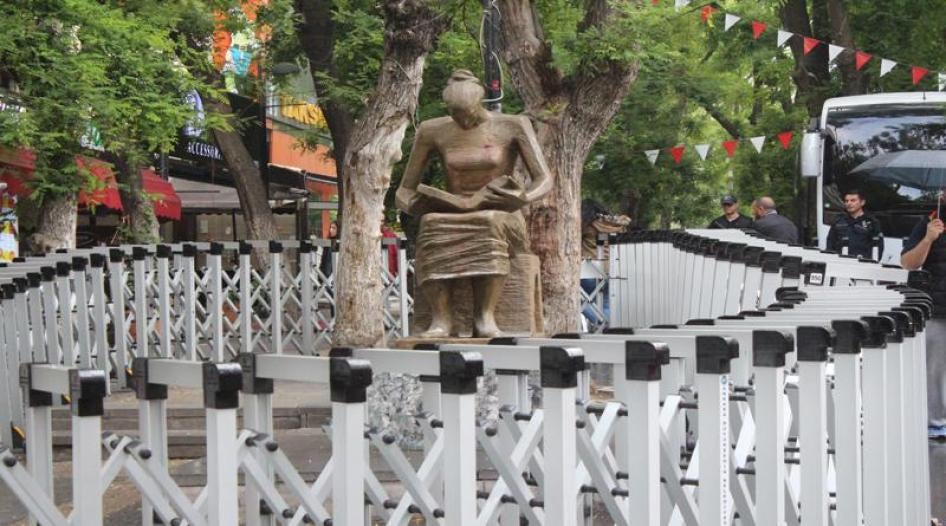(Istanbul)—A draft law being rushed through Turkey’s parliament will preserve many of the abusive powers granted to the president and executive under the country’s recent state of emergency, which formally ended on July 18, 2018, Human Rights Watch said today.
The proposed law will allow authorities under the presidency, for the next three years, to dismiss judges and all other public officials arbitrarily. It also would allow the authorities to restrict movement within Turkey, ban public assemblies, and allow police to hold some suspects for up to 12 days without charge and repeatedly detain them in the same investigation. The bill does not provide adequate court oversight of use of these powers or meaningful redress for victims where use of these powers violates their rights.
“The end of Turkey’s state of emergency should have been a good sign for human rights, but the draft law makes clear that the government’s plan is to end it in name only,” said Hugh Williamson, Europe and Central Asia director at Human Rights Watch. “The government should scrap this law and fully restore human rights and the rule of law in Turkey.”
The two-year state of emergency was imposed following a 2016 violent coup attempt in which 250 people were killed. During it the government was allowed to rule by decree without adequate oversight by parliament or the courts. Turkish authorities dismissed over 130,000 public officials for alleged coup or terrorism links, with courts holding around 77,000 in pretrial detention on those charges, while many more were put on trial. Many media outlets were closed down
An April 2017 referendum approved an executive presidency with weakened judicial and parliamentary checks. Those constitutional changes came fully into force following June 2018 snap elections, giving the presidency many powers equivalent to those under the state of emergency on a permanent basis.
The draft law, which Turkey’s parliamentary justice commission began to review on July 19, would further normalize the emergency powers, Human Rights Watch said. The law is expected to be submitted to Parliament’s general assembly and become law in the coming days, despite strong resistance from the parliamentary opposition.
The 23-article bill states in its introduction that its purpose is to “effectively combat existing terrorist organizations in ordinary times” and prevent coup attempts to “protect fundamental rights and freedoms enshrined in the constitution.” However, some of its main provisions directly conflict with and undermine fundamental human rights protections.
The draft law gives the government authority for three years to dismiss from office any public official, judge, prosecutor, military personnel, or police officer “assessed to have been members of or acted in union with or been in contact with terrorist organizations or structures, entities or groups that the National Security Council has decided are engaged in activities against national security.”
As happened under the state of emergency, those dismissed are likely to be criminally investigated on the same grounds. This measure as it concerns judges and prosecutors ensures that political control of the judiciary will be even further enhanced and that the threat of dismissal and prosecution can be held over the head of any court that might issue an independent ruling displeasing the executive.
It offers the greatest scope for the president to perpetuate the arbitrary and disproportionate measures imposed during two years of state of emergency. Those dismissed will be permitted to appeal only to the same authority that dismissed them. The draft law also permits confiscating their passports, cancelling their spouses’ passports, and gathering information about their spouses and children.
The draft law allows for severe restrictions to be imposed on the rights to freedom of movement and assembly on vague public order grounds. It would give provincial governors – now appointed by the president – wider powers to limit people deemed to impede or disrupt public order or security from entering or leaving certain locations in their provinces for up to 15 days and to prevent all movement or assemblies at particular locations or times on the same grounds. These are powers typically only available during a state of emergency, though there was little need to invoke them over the past two years as most people were too intimidated to protest.
While such powers could be used for legitimate aims, such as preventing armed insurgency, there is nothing to prevent them from being arbitrarily and discriminately applied to people exercising the right to peaceful protest and assembly or to any form of travel within Turkey.
The law includes a measure permitting police over the next three years to detain suspects repeatedly for the same offense in order to take additional statements, with a prosecutor’s consent. This practice, strengthening the role of the police, was also permitted by decree during the state of emergency, and was used often.
Extending this state of emergency measure for another three years could mean that for some suspects (whether held in pretrial detention or at liberty while under criminal investigation), police custody could become a rotating door, leaving suspects at greater risk of abuse in detention. In an October 2017 report Human Rights Watch documented two cases of people taken from pretrial prison detention back into police custody for prolonged periods and tortured.
Another measure initially valid for a three-year period would allow police to detain people arrested on suspicion of terrorism offenses and other crimes against the state for up to 12 days before being charged. Initial police custody would be for two to four days, but it could be extended twice if the person is taken before a judge. This is almost as long as under the state of emergency, which was 7 days extendable to 14. The law cites as justification the problematic example of the UK, where detention in certain circumstances is provided in law for up to 14 days.
Prolonged police custody, even if approved when the suspect is brought before a judge, is particularly alarming given the evidence in Turkey that torture and ill-treatment in police custody has again become a serious concern since the failed coup. Prosecutors have shown no willingness to conduct effective investigations into such allegations or take steps to deter the practice and protect suspects.
The draft law also reduces the frequency with which a judge must review pretrial detention with the person or his lawyer present. Currently detention is reviewed every 30 days with the detainee’s lawyer present and the detainee present at least by video link (SEGBİS). Under the draft law, the court would review a case file every 30 days, but presence of the person via video or in person would only be required every 90 days. This could not only limit the chances of a detainee being released, undermining their right to liberty, but it also would place the detainee at greater risk of abuse, as they will not be physically seen by a judge on a periodic basis.
“The powers to dismiss any judge, to ban any assembly by restricting peoples’ movement, and to arrest people over and over again for the same offense in this draft law are evidence that the state of emergency will continue in all but name,” Williamson said. “The state of emergency may have ended but so has the rule of law.









